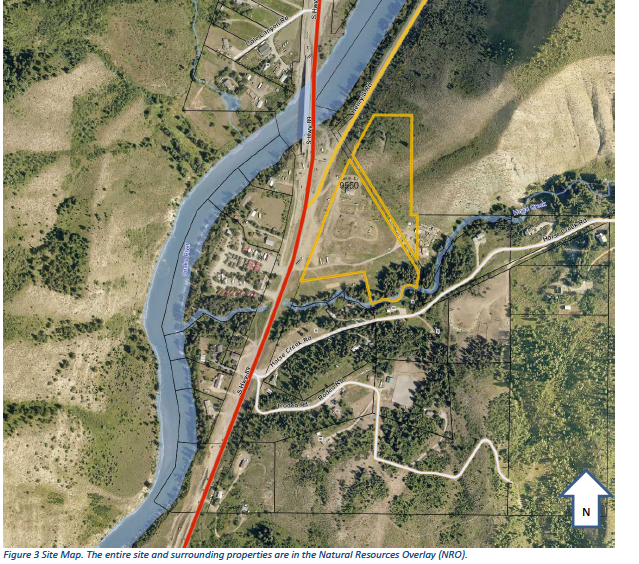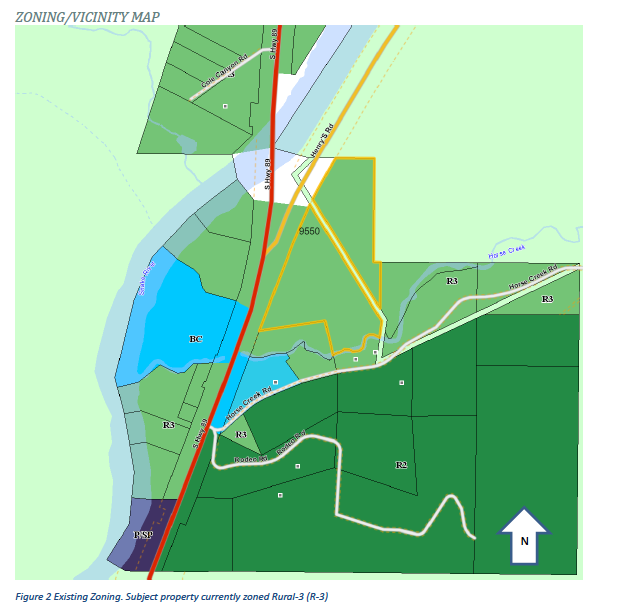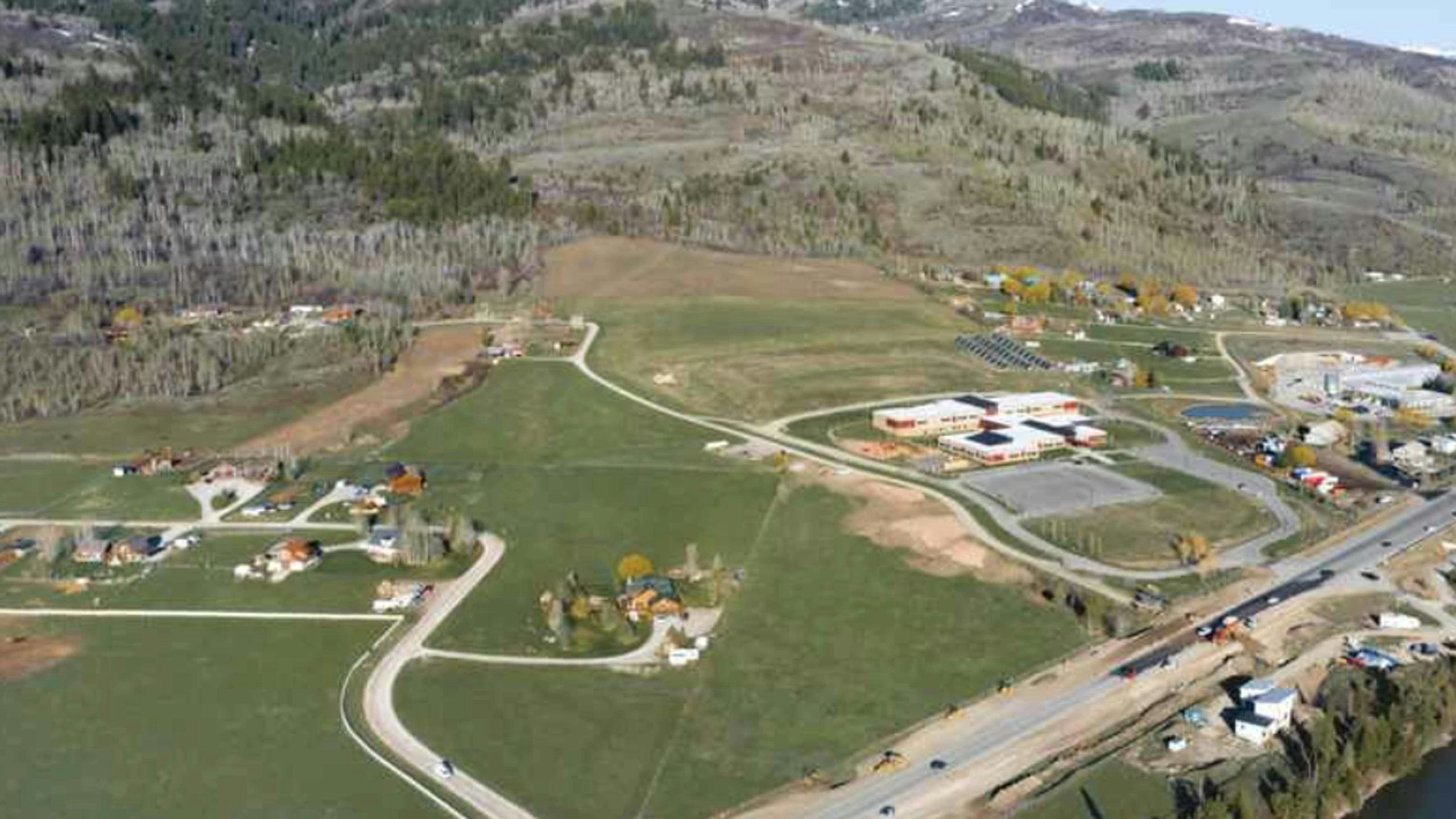The Teton County Commissioners voted unanimously June 8 to approve a zoning change that will pave the way for up to 26 workforce housing units to be built on donated land north of Hoback Junction.
The Jackson Hole Community Housing Trust (JHCHT), which is overseeing the project on behalf of Comunidad, LLC, requested a zone change from rural to suburban. This would allow for development of the detached single-family homes on the 13.13-acre property on Henry’s Road, east of S. Highway 89.
Local residents Paul and Kathy Spicer donated the land which now serves as the grounds for A-OK Corral, a commercial horseback riding operation. The Hughes Charitable Foundation (HCF) also donated $10 million for this and another project.
JHCHT Executive Director Anne Cresswell told commissioners that these gifts offered a “tremendous opportunity to develop desperately affordable housing to provide urgent and essential services for our community’s at-risk and crisis residents.”
The housing is earmarked for personnel who work in 13 different “essential” areas as designated by the Human Services Council organizations. These include law enforcement and emergency services, senior center employees, childcare and literacy workers among others.
The units will be 100% guaranteed deed-restricted affordable housing for employees of the specified local organizations. Deed restrictions are legal documents filed in the county that place various restrictions on the sale and use of a property to ensure that houses remain affordable for future sales.
The Spicers received a round of applause at the meeting when they explained what propelled them to donate the land. Paul Spicer’s father purchased the property 40 years ago. The couple bought it from Spicer’s siblings with the goal of developing it into affordable housing.
“My dad loved this part of the country,” he said. “He died a number of years ago, but he would be looking down and saying that property I bought…is going to help a community I really love.”
Kathy Spicer also spoke, explaining the roots of their company, Comunidad, LLC. The name means ‘community’ in Spanish, which is her first language.
“My parents were immigrants,” she said, “And that’s our wish. This community.”
Molly Hughes, executive director of HCF, also credited the Spicers for their gift of land and said the foundation was thrilled to be part of the project.
“This development will provide housing for locals who are already living in our community,” Hughes told Cowboy State Daily Wednesday. “These homes will be for local families who are currently under-housed or experiencing housing insecurity. These people provide vital services, and we need them living in our community.”
This is the first time in the 31-year history of the Housing Trust that they have had in hand all requisite philanthropy required to develop up to 25 affordable homes, Executive Director Anne Cresswell said.
“Typically, this kind of fundraising takes years to come together,” she said. “It’s our sincere hope that these awe-inspiring commitments will inspire others in the community to be a part of the solution; the lack of affordable housing in Teton County affects every sector of our community.”
Some Potential Problems

The Teton Planning Commission previously recommended approval for the project by a 2-1 vote, but the planning director recommended denying it because the land was in a conservation preservation district. Ryan Hostetter, the county’s principal long-range planner, said the project did not meet the county’s Comprehensive Plan goals for growth management.
Hostetter told Cowboy State Daily that the Comprehensive Plan limits officials’ recommendations to what is allowed in the plan, and typically, new housing projects should be able to tie into existing water and other municipal infrastructure.
The planning commission does not have authority to approve or deny a project but rather gives its recommendation based on these guidelines, Hostetter said.
Some local conservation groups and neighbors voiced opposition to housing of the project’s density being built in the rural area, particularly in the Hoback area which is known for water quality issues and excessive nitrate amounts.
Matt Bambach, water quality advocate for Protect Our Water Jackson Hole, said water quality tests in the canyon have repeatedly indicated levels of nitrate that exceed the Environmental Protection Agency’s (EPAs) maximum containment limit.
High levels of nitrate can have a negative impact on how the blood carries oxygen, particularly in infants, he noted.
“Robust and expensive filtration systems will likely be required to provide new residents with non-harmful water,” he said. “Whether this development will likely negatively impact downgrading water quality and quantity is also a concern.”
Some neighbors expressed concern about wastewater and septic tank systems and how the new homeowners would be able to afford upkeep and care.
Alison Lee, program director for JHCHT, said that they are working with Jackson engineering firm, Jorgensen, to develop an advanced wastewater treatment system for the development.
In a statement in the zoning application, Jorgensen said JHCHT will work with the Teton County engineering department and Wyoming Department of Environmental Quality (DEQ) to overcome challenges and meet water quality requirements once zoning has been approved.
Lee said ongoing operations and maintenance costs would be borne by the residents. This is something they’ve done on the nine housing projects they’ve helped develop, Lee noted, which is built into the project’s budget.
“We produce a robust budget for the incoming HOA (homeowner’s association),” Lee told commissioners. “That’s part of our job as a developer, and in every case, we allow for the maintenance operation and replacement reserves for the infrastructure for those homeowners.”
Meghan Quinn, executive director for Protect Our Water Jackson Hole said this might be an opportunity for Teton County to address long-standing issues in both Fish and Flat Creek areas, particularly in addressing the elevated rates of nitrates in the drinking water.
She noted the more than $5.6 million the commissioners approved to upgrade the wastewater facilities in neighboring Wilson versus the $5,000 it allocated to address public health and environmental issues in Hoback.
“So if you decide to move forward with this rezone, please do not ask the Community Housing Trust to figure out their own water and wastewater issues,” Quinn said via Zoom.
Housing and Labor Breaking Point

The housing imbalance in Teton County has exacerbated in the past decade, according to a March 2022 Teton Region Housing Needs Assessment. Since 2010, jobs have outpaced twice the rate of housing. Currently, the assessment estimated a need for about 5,300 more housing units in the county by 2027.
Not only is there a severe housing shortage, but the few available rentals and properties are far too expensive for the average worker to afford.
Currently, a two-bedroom, one-bath condo in downtown Jackson costs upwards of $749,000 while the median cost price for a one-bedroom home is $1.2 million, according to a May 2022 housing report from Rocket Homes. The average home cost hovers at more than $3.6 million.
This shortage has taken its toll on many local businesses and organizations that are undergoing severe staffing shortages never seen before. Residents say the housing and labor shortages are greatly impacting the ability to provide much-needed services, particularly when it comes to childcare and caring for the disabled and elderly.
Sarah Cavallaro, executive director of Teton Youth and Family Services, one of the organizations that will benefit from the proposed housing, said her organization has hit a “critical point” in its services.
Last year, the group asked the county for an additional $300,000, so it could increase the base pay for employees up to $20 an hour. At the same time, the organization saw a 40% increase in the need for services. Currently, Teton Youth and Family Services is providing services for nine children with an additional six on the waiting list due to staff shortages.
Though the organization has some housing in Victor, Idaho for employees, the entity is budgeting more money for housing incentives in order to attract prospective employees.
“We are totally in support of clean water for everyone,” Cavallaro said, “and if this is approved, I think this gives us the opportunity to have that conversation of how we make this happen. I’ve heard a lot of reasons of why we can’t, and I would love to hear how we can work together as a community to make this happen.”
An essential services worker is a rare breed, Cavallaro added, and she thinks area residents should be doing everything in their power to keep these workers in the community.
“There’s stress in our community right now in case we haven’t noticed,” she said. “I haven’t seen this level of mental health and behavioral health pressures in this community in my 22 years of living here.”
This housing is a good first step, but there’s no question that the demand for these homes will outstrip supply, according to Cresswell.
A 2021 housing survey of 215 Human Service Council employees found that more than half were paying more than 50% in rental rates than they could afford, she said. Twelve months later and the average market rent of a 2-bedroom apartment in Teton County is up 56% from $2,665 in July 2021 to $4,172 in July 2022.
Pushback from Neighbors
Along with water quality and sewer issues, some neighbors questioned the density of housing that would be built on the roughly 6.5 acres that are developable.
One area home and business owner, Jimmy Anderson, sympathized with the employee shortage that has also impacted his businesses but warned traffic congestion on an already busy highway. The road also sees traffic from the local campground and trailer park. Some days he counts up to 50 cars before he can pull out, he said.
“They’re going to be zooming out on the highway,” he said. “It’s a tough little place.”
Anderson is also worried that the influx of dogs – because “everybody in Teton County has a dog” – would attract cougars and other predators.
“Doggies are hors d’oeuvres,” he said.
Other neighbors like Matt and Alyson Bowers said the zoning change would alter the character of the rural area. They said it would place the onus of covering the cost of housing workers on government instead of local business owners. The Bowers were also concerned about the cost of raising property values through increased development in a rural area.
“The affordable housing cry makes zero difference to the proposal,” Matt Bowers wrote in a letter to commissioners. “You have been wasting tax dollars to create seas of subsidized housing for the 16 years I’ve lived here and it’s done nothing but give local businesses a free pass on taking care of their own.”
He asked commissioners to keep the housing in town where density makes more sense.
“The quality of life is nose diving quickly due to agendas like yours,” he wrote.
The Only Tool in the Box
The idea of using the “suburban tool” as a means to deal with the current housing crisis was also a sticking point for both Commissioners Mark Newcomb and Luther Propst.
Ultimately, however, the commissioners said they conceded to the zone change given the severity of the housing crisis as well as the generous donation of both the Spicer family and the HCF. The commissioners noted that the location for the development was not ideal.
Newcomb said that he’s personally going to think of putting a moratorium on suburban zoning changes in the future in order to preserve “community-wide discipline,” so they don’t leave the issue for the next group of five commissioners.
Both Newcomb and Propst are running for election this year.
Propst acknowledged the “slippery slope” prior to his vote to approve the project, which passed 4-0, with Commission Chairwoman Natalia Macker out on maternity leave.
“The location is not ideal, but that’s the county we live in,” Propst said, thanking the Spicers and HCF for their donations.
Meanwhile, Commissioner Mark Barron “enthusiastically” greenlighted the zone change.
“The suburban tool is the only tool potentially being used for affordable housing, so I enthusiastically support this motion,” he said.
Cresswell said the next step is to work on a detailed project planning and pre-construction cost estimating.
“As costs of construction continue to escalate, this is a race against the clock and we hope to break ground as soon as possible,” she said.





